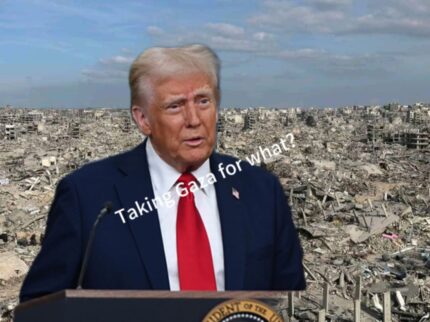President Donald Trump has doubled down on his controversial proposal for the United States to assume control over the Gaza Strip, declaring that the U.S. will “take it, hold it, and cherish it.” During a meeting at the White House on Tuesday, February 11, 2025, with Jordan’s King Abdullah II, Trump reiterated his vision of turning Gaza into the “Riviera of the Middle East” by developing hotels, offices, and infrastructure while relocating its Palestinian population to neighboring countries.
Trump’s proposal, which he initially unveiled last week, has sparked widespread criticism from Arab nations and the international community. Speaking in the Oval Office alongside King Abdullah, Trump insisted that his plan would create jobs and economic opportunities in the region. “I think it could be a diamond,” he said, suggesting that Jordan and Egypt would play a key role in housing displaced Palestinians.
Jordan and Egypt Reject Displacement of Palestinians
King Abdullah II firmly rejected Trump’s proposal, stating that Jordan remains “steadfast against the displacement of Palestinians.” Jordan, which already hosts millions of Palestinian refugees, has repeatedly warned that any forced resettlement from Gaza would destabilize the kingdom and violate international law. Following his meeting with Trump, the Jordanian monarch took to social media to reiterate his country’s position, emphasizing that the “unified Arab stance” opposes any forced movement of Palestinians.
Egypt has also strongly opposed the idea. In a statement issued on Monday, Egypt’s foreign ministry reaffirmed that Cairo is committed to a two-state solution and will not accept any plans that forcibly relocate Gaza’s population. Egypt instead proposed an alternative strategy focused on rebuilding Gaza without uprooting its residents. The Egyptian government has warned that any foreign intervention that disregards Palestinian sovereignty could jeopardize regional stability.
International Condemnation of Trump’s Gaza Plan
Trump’s proposal has drawn sharp criticism from world leaders and international organizations. French President Emmanuel Macron dismissed the idea, stressing that a political solution, rather than forced displacement, is the only viable path forward. The United Nations has also warned that forcibly transferring civilians from occupied territory constitutes a violation of international law and could amount to ethnic cleansing.
Despite these objections, Trump appeared dismissive of concerns about legality and international norms. When asked about the UN’s warning, he sidestepped the question, instead arguing that relocating Palestinians would provide them with “better housing, medical care, and security.” He insisted that a plan would be reached with Arab nations, stating, “We may have a parcel of land in Jordan, a parcel of land in Egypt, and maybe somewhere else where they’ll live happily and safely.”
Trump Suggests Withholding Aid to Pressurize Jordan and Egypt
Amid the lack of regional support for his plan, Trump hinted at the possibility of leveraging U.S. foreign aid to pressure Jordan and Egypt into compliance. Earlier this week, he suggested that Washington could cut economic and military assistance to both countries unless they agreed to absorb Palestinian refugees from Gaza.
However, during his Oval Office remarks, Trump downplayed the need for coercion, stating, “I don’t think we’ll have to do that. I believe we’ll reach a great deal that benefits everyone.” The U.S. provides billions of dollars in aid to Jordan and Egypt annually, and any reduction in funding could have significant consequences for both nations.
Future of Gaza Remains Uncertain Amid Diplomatic Standoff
As discussions continue, Trump’s proposal remains highly contentious, facing resistance from Arab nations, European allies, and international organizations. Jordan and Egypt are working on alternative proposals, including an Egyptian-led initiative that would establish a governance system for Gaza without forced displacement.
While Trump’s insistence on a U.S. takeover of Gaza has alarmed many, the geopolitical reality suggests that implementing such a plan would be extremely difficult. The ongoing crisis in Gaza remains a complex issue, with no clear resolution in sight. As diplomatic tensions rise, the international community is closely monitoring the unfolding developments, wary of the broader implications of Trump’s proposal on Middle East stability.














